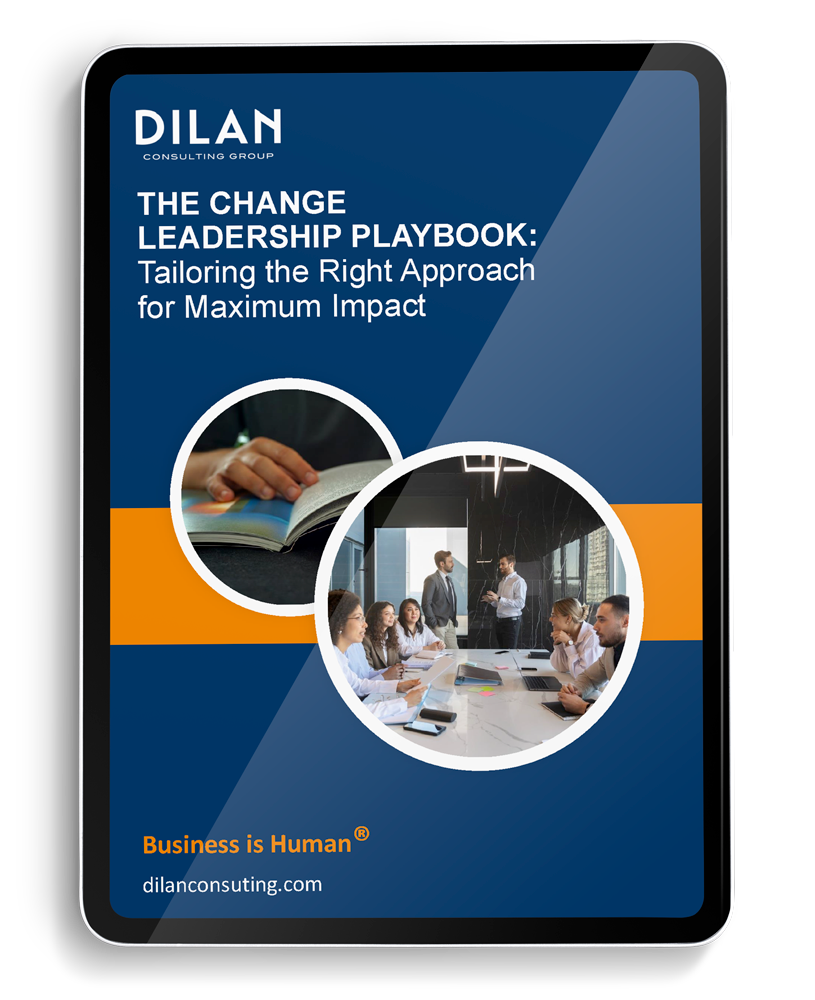What Today’s Leaders Need to Succeed
A mid-size company recently brought us in to develop a leadership program for 16 vice presidents navigating a rapidly evolving business landscape. From the start, it was clear—they weren’t just looking for another leadership workshop. They needed real-world strategies to help them adapt to disruption, lead with emotional intelligence, and make bold decisions in uncertain times.
Like any successful engagement, we began with discovery, ensuring the program tackled their most pressing challenges. Over the course of seven months, this four-day program—integrated with individual coaching between sessions—would equip these leaders with the skills necessary to drive business success.
But before designing the experience, we dug into the latest research on leadership trends for 2025. What does it take to lead effectively today? Industry reports, economic shifts, and workforce expectations all pointed to six essential leadership skills. These aren’t just theories—they’re the core competencies that determine who thrives and who struggles in today’s high-stakes environment.
Mastering these six skills allows leaders to navigate complexity, drive innovation, and build high-performing teams. Whether leading a small department or an entire organization, developing these abilities will set the best apart from the rest.
1. Adaptability & Resilience
Definition
Adaptability is the ability to adjust to new conditions, pivot strategies, and remain effective despite uncertainty (Reeves & Deimler, 2011). Resilience refers to the capacity to recover quickly from setbacks and maintain focus under pressure (Coutu, 2002). Leaders who demonstrate both traits can guide organizations through disruption with confidence.
Why It Matters in 2025
AI-driven automation, economic instability, and workforce shifts demand leaders who embrace uncertainty and proactively drive change. Those who cultivate resilience keep engagement and productivity high, even in volatile conditions.
Research Insight: The World Economic Forum’s Future of Jobs Report 2023 ranks adaptability among the top five leadership skills needed for 2025 (World Economic Forum, 2023).
Research Insight: A McKinsey study highlights that leaders who intentionally build team resilience succeed in volatile business environments (McKinsey & Company, 2023).
How to Build It:
- Adopt a Growth Mindset – Reframe challenges as learning opportunities. Encourage teams to innovate and experiment.
- Engage in Scenario Planning – Map out best- and worst-case scenarios to increase flexibility in decision-making.
2. Emotional Intelligence (EQ) & Empathy
Definition
Emotional intelligence (EQ) is recognizing, understanding, and managing emotions while staying attuned to others’ emotions (Goleman, 1995). Empathy, a core component of EQ, is understanding another person’s perspective and responding compassionately (Duan & Hill, 1996). High-EQ leaders foster trust, collaboration, and engagement.
Why It Matters in 2025
Leaders who effectively regulate emotions—both their own and others’—build strong relationships and high-performing teams. Emotional intelligence creates work environments where employees thrive.
Research Insight: Harvard Business Review identifies self-awareness, empathy, and relationship management as defining traits of effective leaders (Goleman, 2013).
Research Insight: Deloitte’s 2024 Global Human Capital Trends Report shows that organizations prioritizing emotional intelligence and well-being create a competitive advantage (Deloitte, 2024).
How to Build It:
- Practice Active Listening – Ask open-ended questions and fully process responses before reacting.
- Develop Self-Awareness – Use emotional intelligence assessments and executive coaching for deeper insights.
3. Digital Fluency & AI Literacy
Definition
Digital fluency is understanding and effectively using digital tools and technologies. AI literacy refers to a leader’s ability to grasp and apply artificial intelligence fundamentals to business strategy (Westerman et al., 2014). Leaders with these skills leverage technology for better decision-making and innovation.
Why It Matters in 2025
AI is already reshaping industries. Leaders who understand AI’s role in decision-making, automation, and business models gain a competitive advantage—those who resist digital transformation risk obsolescence.
Research Insight: MIT Sloan Management Review states that leaders must become “digitally savvy” to navigate AI-driven business models (MIT Sloan, 2023).
Research Insight: Gartner’s Future of Work Trends Report 2024 predicts that 60% of leaders will require AI training by 2025 (Gartner, 2024).
How to Build It:
- Stay Informed on AI Trends by Engaging with AI research, attending industry conferences, and taking executive-level AI courses.
- Use AI-Powered Tools – Implement AI-driven analytics and automation to increase efficiency and improve decision-making.
4. Strategic Thinking & Decision-Making
Definition
Strategic thinking involves analyzing complex situations, anticipating future challenges, and making data-driven decisions aligned with long-term goals (Liedtka, 1998). Leaders with this skill balance short-term agility with long-term vision.
Why It Matters in 2025
Success requires leaders to navigate uncertainty with bold, forward-thinking strategies. Strategic decision-makers outperform competitors by aligning business objectives with market realities.
Research Insight: Harvard Business Review found that the best leaders balance adaptability with consistency, fostering innovation and stability (HBR, 2017).
Research Insight: Harvard Business Review emphasizes that bold business strategies lead to stronger long-term performance and that CEOs who take calculated risks outperform their competitors (Ryan, 2024).
How to Build It:
- Make Time for Strategic Reflection – Dedicate weekly time to focus on big-picture planning.
- Use Data-Driven Frameworks – Apply AI insights, market analysis, and scenario modeling to make informed, confident decisions.
5. Inclusive Leadership & DEI
Definition
Inclusive leadership fosters diverse teams and creates environments where everyone feels valued and heard (Bourke & Dillon, 2018). Effective leaders recognize diversity as a driver of innovation and business performance.
Why It Matters in 2025
Companies with inclusive leadership teams outperform competitors, retain top talent, and drive innovation. Employees increasingly expect workplaces where they feel a sense of belonging.
Research Insight: Bain & Company found that organizations with inclusive leadership drive higher innovation and employee engagement (Bain & Company, 2023).
Research Insight: McKinsey’s “Diversity Wins” study shows that diverse executive teams outperform their peers financially by 36% (McKinsey & Company, 2020).
How to Build It:
- Foster Psychological Safety – Create an environment where employees feel safe voicing ideas.
- Hold Leaders Accountable for DEI Goals – Measure progress and integrate inclusion goals into leadership KPIs.
6. Coaching & People Development
Definition
Coaching involves mentoring, developing, and empowering employees rather than managing their tasks (Ibarra & Scoular, 2019). Leaders who coach foster a culture of continuous learning and high performance.
Why It Matters in 2025
As skills gaps widen, leaders must focus on upskilling and mentorship. Organizations that invest in coaching see higher engagement, innovation, and retention.
Research Insight: Josh Bersin’s 2024 Corporate Learning Guide highlights that leaders who act as coaches build more adaptable and high-performing teams (Bersin, 2024).
Research Insight: LinkedIn Learning’s 2024 Workplace Learning Report found that companies prioritizing leadership development see a 30% increase in engagement (LinkedIn Learning, 2024).
How to Build It:
- Shift from Managing to Coaching – Provide real-time feedback and guidance rather than assigning tasks.
- Invest in Leadership Development Programs – Encourage continuous learning through workshops and mentorship initiatives.
Final Thoughts
Mastering adaptability, emotional intelligence, digital fluency, and strategic decision-making prepares leaders to succeed in 2025 and beyond. Building these competencies allows organizations to thrive in disruption, drive innovation, and cultivate high-performing teams.
Looking to strengthen these skills? Join the Leadership Essentials Workshop on March 6-7, 2025 and take your leadership to the next level.
References
Bain & Company. (2023). The fabric of belonging: How to weave an inclusive culture .
Bersin, J. (2024). The definitive guide to corporate learning in 2024 .
Coutu, D. L. (2002). How resilience works. Harvard Business Review, 80 (5), 46-56.
Deloitte. (2024). 2024 global human capital trends .
Duan, C., & Hill, C. E. (1996). The current state of empathy research. Journal of Counseling Psychology, 43 (3), 261–274.
Gartner. (2024). Future of work trends 2024 .
Goleman, D. (1995). Emotional intelligence: Why it can matter more than IQ . Bantam Books.
Goleman, D. (2013). The focused leader. Harvard Business Review .
Harvard Business Review. (2021). The best leaders balance agility and consistency .
Liedtka, J. M. (1998). Strategic thinking: Can it be taught? Long Range Planning, 31 (1), 120-129.
LinkedIn Learning. (2024). Workplace learning report 2024 .
McKinsey & Company. (2020). Diversity wins: How inclusion matters .
McKinsey & Company. (2023). The state of organizations 2023 .
McKinsey & Company. (2024). The strategy analytics leaders need now .
MIT Sloan Management Review. (2023). The new leadership playbook for the digital age .
Reeves, M., & Deimler, M. (2011). Adaptability: The new competitive advantage. Harvard Business Review, 89 (7-8), 134-141.
Ryan, T. (2024). CEOs, is your business strategy bold enough? Harvard Business Review .
Westerman, G., Bonnet, D., & McAfee, A. (2014). Leading digital: Turning technology into business transformation . Harvard Business Review Press.
World Economic Forum. (2023). The future of jobs report 2023 .



